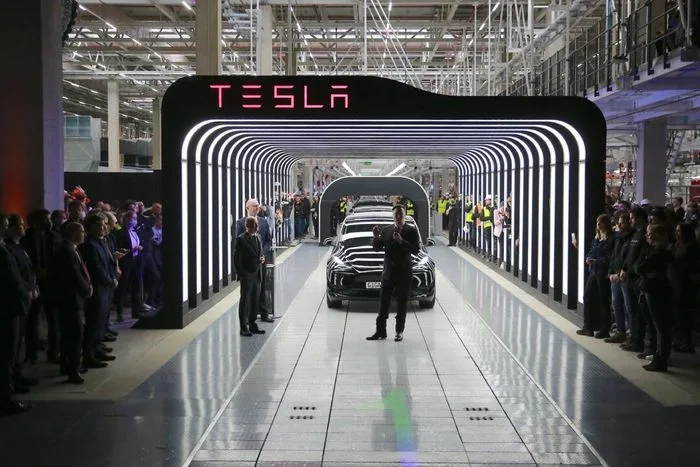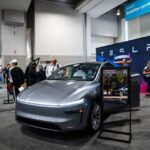By Tom Ozimek
Tesla’s European sales slumped sharply in July, with steep drops in Germany and Britain underscoring the electric‑vehicle maker’s deepening challenges in two of the region’s most important markets.
New registrations in the UK plunged about 60 percent to 987 vehicles, down from roughly 2,462 a year earlier, according to data released on Aug. 5 from the Society of Motor Manufacturers and Traders.
In Germany, Europe’s largest auto market, Tesla sales fell 55.1 percent to 1,110 units, figures from the Federal Motor Transport Authority show. For the first seven months of 2025, Tesla registrations in Germany dropped nearly 58 percent to 10,000 vehicles.
Tesla’s sales collapse comes as Chinese rival BYD posted explosive growth. UK sales for the Shenzhen‑based automaker surged almost fourfold to 3,184 units in July, while German sales jumped nearly fivefold to 1,126 units.
Broader Slide
The July numbers extend a months‑long trend of Tesla losing ground in Europe. Recent data from the European Automobile Manufacturers Association show the company has shed market share for six consecutive months, pressured by intensifying competition from Chinese electric vehicle (EV) makers, waning subsidies, and public opinion about CEO Elon Musk’s polarizing public stances and ties to the Trump administration.
The weakness in Europe coincides with Tesla’s disappointing second‑quarter earnings. The company reported a 12 percent year‑on‑year drop in total revenue to $22.5 billion, its steepest fall in a decade, and a 42 percent decline in operating income to $923 million. Vehicle deliveries fell 13 percent globally, including a 12 percent slide in Model 3/Y deliveries, the company’s core models.
Musk acknowledged on an earnings call that Tesla may face “a few rough quarters” amid shifting tariffs, expiring EV tax credits in the United States, and evolving regulatory frameworks for autonomous driving.
Despite the sales slump, Tesla is accelerating a strategic shift beyond pure EV manufacturing. The company launched its first robotaxi service in Austin, Texas, in June and plans to scale the service to additional U.S. cities, with a purpose‑built Cybercab slated for volume production in 2026. It also began early builds of a more affordable model—described as a Model Y lookalike—with mass production targeted for late 2025.
Tesla’s board this month approved a $29 billion stock‑based award for Musk, replacing a record‑setting 2018 package voided by a Delaware court ruling. Directors called retaining Musk critical as Tesla pivots toward artificial intelligence, robotics, and energy storage businesses.
In a letter to shareholders, Tesla’s board described Musk’s new compensation package as “an important first step” in rewarding him for his work at the company. The directors cited his “unique vision and leadership” in building Tesla’s shareholder value and said that “retaining Elon is more important than ever before” as the company faces a challenging transition.
“To succeed, it requires a leader who combines strategic foresight, adaptability, and relentless execution to outperform competition and inspire the team,” the board said. “Elon has demonstrated these unmatched leadership abilities time and time again with his unparalleled track record of delivering shareholder value since he joined as a founding figure and spearheaded the transformation of our extraordinary company.”






